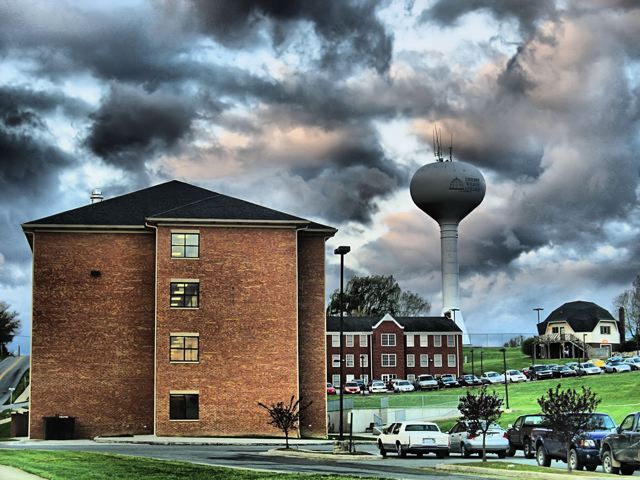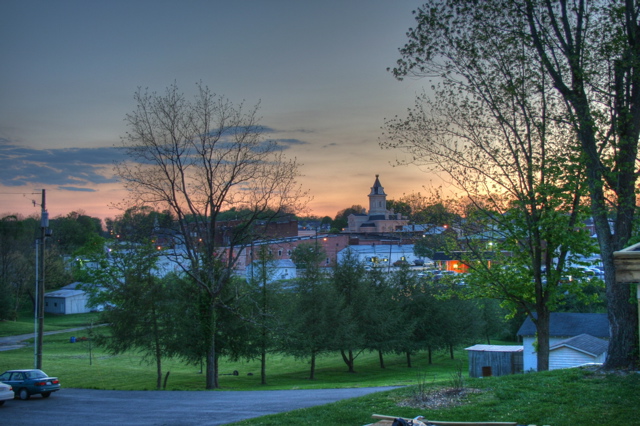| ||||||||||
Dr. Ronald P. Rogers CHIROPRACTOR Support for your body's natural healing capabilities 270-384-5554 Click here for details 


Columbia Gas Dept. GAS LEAK or GAS SMELL Contact Numbers 24 hrs/ 365 days 270-384-2006 or 9-1-1 Call before you dig Visit ColumbiaMagazine's Directory of Churches Addresses, times, phone numbers and more for churches in Adair County Find Great Stuff in ColumbiaMagazine's Classified Ads Antiques, Help Wanted, Autos, Real Estate, Legal Notices, More... 

|
G. Crump: How I discovered Columbia . . . when Columbus didn't "For five years during WWII, townslarge and smallturned off street lightsand covered windows with heavy dark blinds to hide the inside lights so enemy bombers could not use town lights to navigate to a target. But now Columbia had lights,playing boldly through tree limbs, winking back at the young boy eager to get on with his life. I kept returning to the lights of downtown, as if they were lighting my pathwayin life. The longer I looked at them, the more hynotic they became and the more glorious Columbia seemed." By Gordon B. Crump, aka "Hermit in the Woods" hermit1@alltel.net Some days are meant to be memorable. The others shouldn't count against our lifetime. I don't remember who expressed that idea first, but I have made it my own. One of my mostmemorable days was in May, 1947. My whole life seemed a preliminary to discovering Columbia,each segment of it leading me to Adair County. I discovered Columbia that bright day, and began a lifetime love affair with the best place on earth. Grew up on tobacco plantation, south of Nashville I grew up on a tobacco plantation, south of Nashville. Thetimeperiodlay in the heart of the Great Depression that FDR could not cure, but World War II spendingdid. In 14 years(1929-1943),before I was in college,the Depressiontook the last of our family assets. My father, Willie Crump, was a teacher and principal, rated a scholar in both Greek and Latin. Tobacco became a savior when the size of the family outgrew teacher pay. I loved the life there,endlessly exploring the 14 rooms in the Big House,imagining Jeff Davis himself standing at the mantel in the Great Room,resplendant in swallow-tail coat,explaining the attack at Charleston Harbor to Mr. Willie, my dad and Mother Crump, my mother; fishing in the creek at the bottom of the hill, andprowling the remains of slave cabins back of the Big House for souvenirsof a sad and misunderstood era. One formerslave,thennearing 90 and born there, remainedin ahouse deeded to him byhis 'owner,' separate from what was left of the original plantation. He was Uncle Henry, a title of respect, not denigration. He taught me to fish and to make fishhooks from small brass safety pins.He told me stories about the War for Southern Independence, slaves and what the area looked like when he was a boy. Our friendship did not end until his death, when I was 19. As a youngster put to work in the tobacco fields as part of my disciplinary training, I soon discovered I did not enjoy growing tobacco and could not have been more than 10 when Iknew I must find some otherlife's work moreinteresting and enjoyable. I decided that work should be as a small town lawyer. That governed what I read, what I thought and managed to see of the profession. I played hookey from school to sit in the courtroom and watch what to me were great dramas as lawyers scuffled over whether someone stole someone else's hog and one time, over theownership of found money. Back to Hart County, our ancestral hoome My family, now only my parents, my brother, John and me;moved back to Hart County, our ancestralgrounds. When I was a junior in high school, I wanted to speed up the process whereby I would stand in the courtroom defending some greatpoint of law, I learnedthat by examination I might enter college,before graduating high school.If I could pass the test. Before our family fortunes tumbled into ruins, Iwas confident I would study law at Harvard University, and strived for the grade point that would justify admission. But with finances so dire, I thought to ease the cost by first attending college in Kentucky. I soon discovered that if I attended any of the state collegesI would probably lose credits earned evenfrom UK or U.of L. Lindsey Wilson's credits would transfer to Harvard intact But there was one college individually accredited by Harvard where credits were transferable intact . . . Lindsey Wilson College at Columbia, KY. That was how I came to choose to attend Lindsey Wilson, though I had never seen it. I never got to Harvard,it was a money thing;and I am poorer for it. I spent my working life as ajournalist and editor.I have no apologes or regrets for that work. But my late son, GordonIV, did get to Harvard.My younger son, Dennis Crump, graduated from Lindsey, holds three degreesand is now finishing up work on his doctor's degree. I negotiated admission to Lindseyand began with the summer session. The days at Munfordville waiting to come to Lindsey were hellishly long. I have always blamed the wait for the fact that I may have been the only boy inthe USto get a warning ticket for speeding on a bicycle. (Lt. Reed Bolton of the then-Kentucky Highway Patrol, insisted that I came down the long hill to the Bucker Bridge across Green River doing no less than 47 miles an hour in a 25 mph zone. (I acted as my own lawyer, and luckily escaped hanging. I got off with a warning and a threat that next time the Lieutenant" would tell Mr.Willie his son broke the law." We both knew that was roughly equal to facing a firing squad before breakfast. The daydawned when I was to leave homeand go out into the world and prepare myself for my life's work. My brother would drive me to Columbia My brother, John, would drive me to Columbia.But something came up and I had to travel by bus (freshmen couldn't have cars with them, and anyway, mine was a stylishcutawaywreck, replete with foxtail flying from the antenna,no radio, just an antenna;a bulb ooga horn and 'Lady smokers, throw your butts in here'letteredon the rumble seat.) I first tooka Greyhound from Munfordville to Cave City and then a nostalgic ride on Short Way Lines to Columbia. The bus was a prewar model that groaned and complained at every tiny rise in the road along Highway 80 and at times threatened to quit thesuch workentirely. I looked through the window at what is still some of the world's great scenery. Passing through the Palisades I reminded myself to remember that view, and I have done so. Nearing the Public Square for the first time,I took in as much of the face of Columbia as one young man can. The driver kicked the ancient bus out of gear,coasting onto the Square, stopping at Campbellsville Street to unload before proceeding to the Bus Station behind the hotel. I gathered my baggage and struggled up Lindsey Hill, happy as aPowerball winner to be there. Once enrolling and dropping the baggage in the old Boys Dorm, I ate a familiar menu at the dining hall in the basement of the old gym. Katie Murrell Library had just been built I knew no one and had no idea how to spend the evening, I walked across the campus to thebrink,where the Katie MurrellLibrary hadjust been built. The gathering night was warm as a mother's caress.I took in the fragant air and looked toward the downtown. For five years during WWII, townslarge and smallturned off street lightsand covered windows with heavy dark blinds to hide the inside lights so, enemy bombers could not use town lights to navigate to a target. But now Columbia had lights,playing boldly through tree limbs, winking back at the young boy eager to get on with his life. I kept returning to the lights of downtown, as if they were lighting my pathwayin life. The longer I looked at them, the morehynotic they became and the more glorious Columbia seemed. I thought they looked like stardust strewn in the bottom of agreat bowl. I knew I wasat home for the rest of my life. I would live many places, Tokyo, New York, Singapore, Waikiki, San Franciscoand elsewhere, but Columbia became home that night... more home than any place I lived. And I would spend as much of my life there as circumstances would permit. Soon I must go back to Lindsey Hill Oneevening soon, I must go back to Lindsey Hill and see the lights again. Hearing again from memory the beautiful chimes that played at dusk. Those who believe Thomas Wolfe's admonitionthat "you can't go home again," never lived in Columbia... nor attended Lindsey Wlson College. Gordon Crump, one of Kentucky's truly great writers and journalists, now lives in the most enviable way a man can: Doing exactly what he wants to do off Cedar Grove Road, Clay Ridge, Adair County, KY. Related links Click here for story, "At 80, Gordon Crump proves you can live the life you want," about the Hermit of Clay Ridge Click here to read "Gordon Crump is truly a treasured Adair Countian This story was posted on 2007-04-29 06:11:18
Printable: this page is now automatically formatted for printing.
Have comments or corrections for this story? Use our contact form and let us know.
More articles from topic News:
Regular Eastern Star meeting is each 4th Thursday Columbia Garden Club Organizing Columbia Post Office asks help to Stamp Out Hunger Postmaster Murrell invites public to open house Watch for it Sunday: A special story by Gordon Crump Bearwallow UMC Fish Fry is Saturday, May 5, 2007 Parks & Recreation Board announces logo contest VFW Ladies' Auxiliary meets Tues. May 1, 2007 at 6pm Adair Fiscal Court Emergency Meeting Monday, April 30, 2007 Landscaping volunteers are needed at library View even more articles in topic News |


|
||||||||
|
| ||||||||||
|
Quick Links to Popular Features
Looking for a story or picture? Try our Photo Archive or our Stories Archive for all the information that's appeared on ColumbiaMagazine.com. | ||||||||||
|
Contact us: Columbia Magazine and columbiamagazine.com are published by Linda Waggener and Pen Waggener, PO Box 906, Columbia, KY 42728. Please use our contact page, or send questions about technical issues with this site to webmaster@columbiamagazine.com. All logos and trademarks used on this site are property of their respective owners. All comments remain the property and responsibility of their posters, all articles and photos remain the property of their creators, and all the rest is copyright 1995-Present by Columbia Magazine. Privacy policy: use of this site requires no sharing of information. Voluntarily shared information may be published and made available to the public on this site and/or stored electronically. Anonymous submissions will be subject to additional verification. Cookies are not required to use our site. However, if you have cookies enabled in your web browser, some of our advertisers may use cookies for interest-based advertising across multiple domains. For more information about third-party advertising, visit the NAI web privacy site.
| ||||||||||
























































